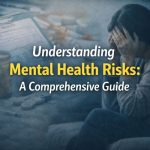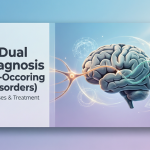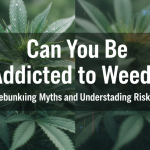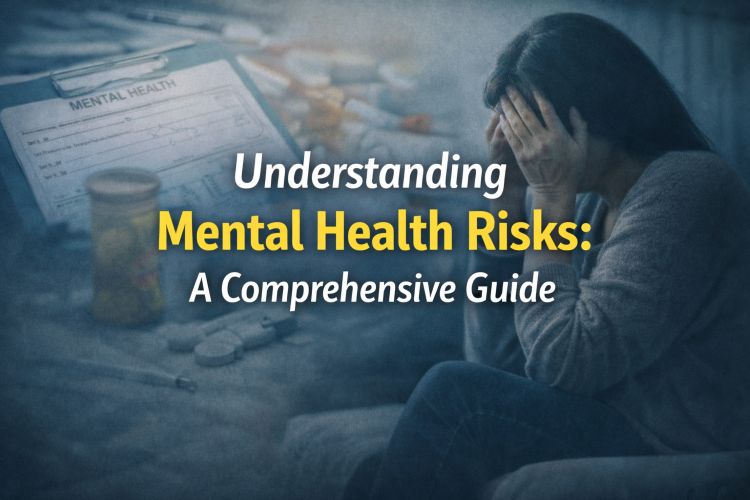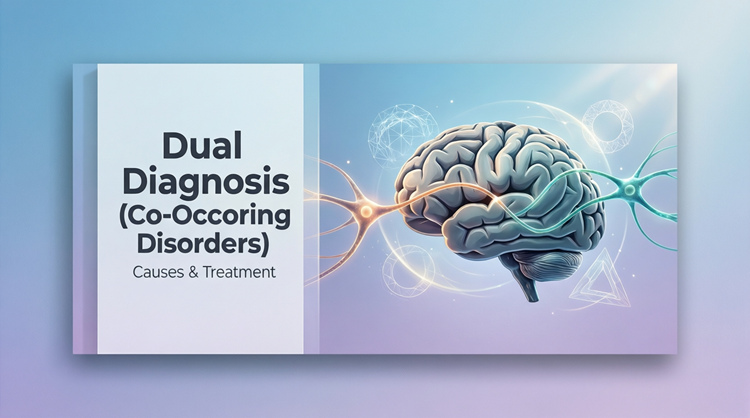There is still a lot of confusion about bipolar disorder in society, yet it is a severe mental illness that impacts numerous individuals on the planet. In this blog, we will be able to understand what bipolar disorder is, the different classifications of it, and the available forms of treatment. By understanding this disorder, we can help more people who suffer from it and make society more tolerant and helpful.
What is Bipolar Disorder?
Bipolar disorder earlier known as manic-depressive illness is another mental health disorder that involves cycling between moods that are extremely low and extremely high. Such fluctuations can significantly affect the subject’s ability to carry out everyday activities. Bipolar disorder also occurs across the lifespan, in both male and female patients, across different ethnicities with an estimated prevalence of about 2.8% in the United States alone.
Affected individuals suffer from episodes of mania and depression, with such episodes persisting for as long as several days, weeks, or months. During severe episodes, they may be elated, overly energized, and agitated. Whereas, depressive episodes can induce moods of low spirits, despondence, and lack of interest in once-pleasant activities. It is for this reason that it is key to raise awareness of mood swings as a sign that requires proper treatment and assistance.
Types of Bipolar Disorder
Bipolar disorder can be divided into several types, which are known to have different features. The usual categories are Bipolar I Disorder, Bipolar II Disorder, Cyclothymic Disorder, and Other bipolar and related disorders. One needs to be able to distinguish between these types so that proper diagnosis and treatment can be administered.

Bipolar I Disorder
Bipolar I Disorder can be diagnosed with the rationale of the occurrence of at least one manic episode, which has a duration of not less than 7 consecutive days or the individual requires hospitalization. The symptoms that patients might display during a manic phase of bipolar disorder include mood elevation, increased energy, reduced need for sleep, grandiosity, and impulsiveness. It is necessary to underline that these symptoms can markedly interfere with a patient’s activity and may result in risk-taking behavior or psychoses.
Bipolar II Disorder
Hypomanic episodes are present in Bipolar II Disorder and the subject is required to experience at least one in their lifetime and one major depressive episode. Hypomanic episodes are like manic episodes but less severe and the symptoms do not lead to major social or occupational disability. Nevertheless, the depressive episodes in Bipolar II Disorder are overly deep and certainly do not allow for a comfortable existence.
Cyclothymic Disorder
Cyclothymic Disorder describes a condition in which the patient experiences mood swings that do not fall under manic, hypomanic, or major depressive episodes, but last for a long time. This disorder makes patients show hypomanic symptoms and depressive symptoms within at least a 2-year cycle. These mood swings are not as extreme but are more lasting than in Bipolar I or II Disorder.
100% Confidential Support is Available 24/7
No matter what you’re going through, you’re not alone. Our dedicated team is here to provide a safe, judgment-free space where you can talk openly and honestly. Whether you need emotional support, resources, or just someone to listen.
We’re here for you—completely confidential and always respectful of your privacy. Call us today!
Bipolar and Related Other Specified and Unspecified
These are categories that involve bipolar symptoms that can not be classified under the discussed types. For instance, an individual may have hypomanic episodes while other times they do not have any major depressive episodes or they merry go through rapid cycles of mood swings.
Deland Treatment Solutions
Battling with Drug and Alcohol Addition? Remember, you are not alone and we are here to help you!
Treatment Options
There is no cure for bipolar disorder but it can be effectively managed by medication, therapy, and adopting certain lifestyle changes. Every patient should have a proper personalized treatment plan, which may need to be changed from time to time due to changes in one’s condition and required management.
Medications
Medications are the primary treatment for bipolar disorder and are important in maintaining an individual’s mood and mood swings.
- Mood Stabilizers: Lithium is one of the most common mood stabilizers and those who use it noticed a significant decrease in intensity and frequency of mood swings. Other mood stabilisers-which include valproate and carbamazepine are also used at times as well.
- Antipsychotics: The category of antipsychotics that can be used to control manic or mixed episodes or in some cases contribute to the treatment of depressive episodes includes atypical antipsychotics, including quetiapine, risperidone, and olanzapine.
- Antidepressants: These are used sparingly because they may cause the onset of manic episodes in some patients. These medications are usually taken with mood stabilizers or antipsychotics to help avert this side effect.
Everyone needs to consult with his or her doctor to ask about the medication that is the most suitable and to identify a proper dose because side effects and reactions may be different.
Psychotherapy
Psychotherapy is an important measure in managing bipolar disorder.
- Cognitive-Behavioral Therapy (CBT): CBT assists people to recognize and alter mood-altering patterns of thinking and behavior.
- Acceptance and Commitment Therapy: ACT is a type of psychotherapy that helps individuals accept difficult thoughts and feelings rather than struggling with them. It emphasizes mindfulness techniques, values clarification, and commitment to behavior change.
- Psychoeducation: This is especially significant in the case of bipolar disorder, as providing clients, as well as their families, with information about the condition may alleviate stigma-related issues and improve compliance with the prescribed treatment plans.
Lifestyle Modifications and Self-Care Strategies
- Regular Exercise: Research has shown that some level of physical activity can make people feel happy and improve their general health.
- Healthy Diet: Eating a healthy portion of food excluding junk foods will do a lot in ensuring that one does not give up easily due to fatigue or normally low moods.
- Sleep Hygiene: Abnormal sleep schedules should be avoided because they may lead to mood episodes, and the sleeper should establish regular sleeping patterns when possible.
- Stress Management: Practical interventions like exercise, yoga, and other relaxation strategies, which involve mindfulness and meditation, can help manage emotions.
These lifestyle changes can be made together with professional treatment to advance control of bipolar disorder and optimize the quality of life.
Living with Bipolar Disorder
Being diagnosed with bipolar disorder is not easy, but this should not restrain one from living a quality life since there are always ways of combating this illness.
- Stay Informed: Knowledge of the condition may help a person distinguish signs of oncoming mood episodes and get appropriate treatment.
- Develop a Routine: Routine and adherence to certain everyday routine steps may contribute to the regularization of mood.
- Monitor Mood: Regular recording of moods can also help in the identification of trends and possible trigger points.
Bipolar disorder is a long-term mental health illness that presents in different forms which makes it important to have a clear understanding of the different forms of bipolar disorder for correct diagnosis and treatment. They all differ from one another in terms of symptoms, severity, and how best to address them and can range from Bipolar I, Bipolar II, Cyclothymic Disorder, or even others that have not yet had clear classifications.
By acknowledging the role of proper diagnosis, accepting medication, psychotherapy, and lifestyle changes as valid treatment options, and emphasizing the value of a stable social environment, it is possible to help people with bipolar disorder experience stable and meaningful lives.

If you or someone you know is suffering from this disorder, please check out our bipolar treatment program offered at Deland Treatment Solutions or Call us at (386) 866-8689 today.







